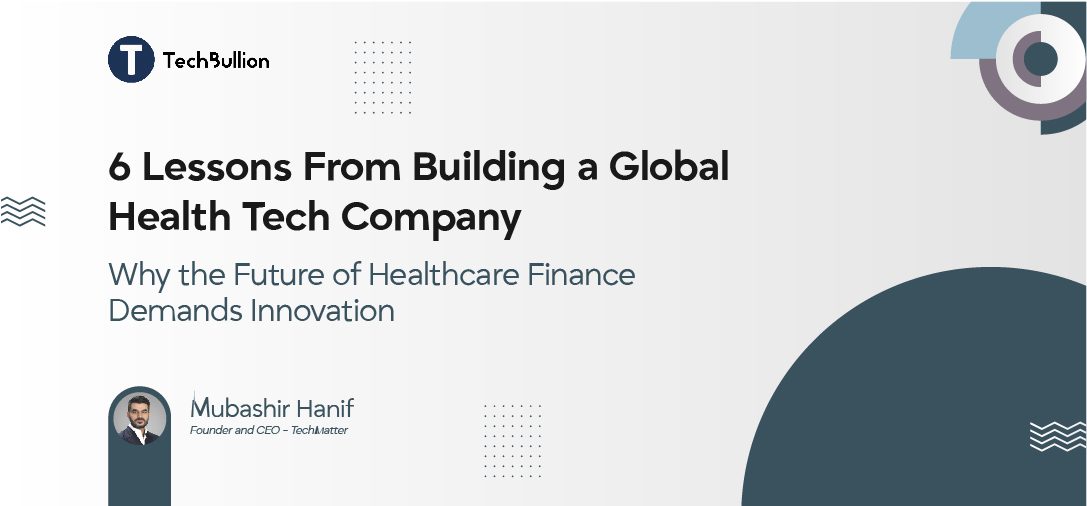When I founded TechMatter in 2017, the ambition was not to become the biggest health technology company, but to solve some of the most pressing inefficiencies healthcare providers face every day. Medical billing delays, claim denials, compliance requirements, and shrinking reimbursement rates were creating a financial chokehold on practices large and small.
Fast forward to today, TechMatter has grown into a global health tech company with more than 500 professionals serving providers across the US, UK, UAE, and South Asia. Our teams deliver revenue cycle management (RCM), medical billing, credentialing, IT support, and proprietary technology platforms that help providers achieve efficiency and financial sustainability.
Scaling a company in such a multi-faceted and high-stakes industry has taught me lessons that go beyond business fundamentals. They reflect the realities of healthcare finance in an era of growing costs, rising patient demand, and constant regulatory change. And they point toward one conclusion: Innovation is no longer optional. It is survival.
Here are five lessons that shaped our journey and why they matter for the future of healthcare finance.
1) Purpose Must Outlast Profit
Healthcare is one of the few industries where the bottom line cannot be the only measure of success. When we launched TechMatter, our guiding principle was purpose: helping providers work smarter, not harder.
Profitability matters, but so does reducing administrative burden, improving compliance, and ensuring providers can focus on patients. By anchoring decisions in purpose, companies not only build trust but also create solutions that endure beyond short-term financial cycles.
2) People Drive Innovation, Not Just Technology
Technology gets the headlines, but people make transformation possible. Growing TechMatter from a small founding team to a workforce of 500 taught me the importance of culture.
We built around three values: empowerment, fairness, and consistency. Empowered people innovate. Fairness builds loyalty. Consistency earns trust. Without these foundations, even the most advanced software will fail to create a real-world impact. Leaders must remember that technology amplifies human capacity, but does not replace it.
3) Automation Is Now the Backbone of Healthcare Finance
The financial pressures on healthcare providers are real. Margins are narrowing, compliance audits are intensifying, and administrative tasks are multiplying. In this environment, relying on manual workflows is not only inefficient but also unsustainable.
Automation has become the backbone of modern healthcare finance. That’s why we launched RCM Matter’s next-generation medical billing and revenue cycle software. It was engineered to reduce denials, accelerate reimbursements, and streamline billing through intelligent automation.
But the principle extends beyond our own solution. The providers who integrate automation into their revenue cycles will be the ones able to withstand reimbursement cuts and regulatory complexity. Those who delay will find themselves at a growing disadvantage.
4) Ethics Must Lead Innovation
Healthcare runs on trust, and technology must never undermine it. As AI, machine learning, and predictive analytics enter revenue cycle management, leaders must prioritize ethical frameworks.
At TechMatter, we adhere to three pillars: data privacy, transparency, and human oversight. Patient information must be protected with the highest security standards. Clients deserve to understand how automation makes decisions. And no system should replace human judgment.
Innovation without ethics is short-lived. In healthcare finance, where accuracy and trust are inseparable, it can be catastrophic.
5) Think Globally, Solve Locally
Operating across multiple geographies has reinforced an important truth: the challenges of healthcare finance (denials, compliance demands, revenue leakage) are universal. But the solutions must respect local realities.
A US practice operating under Medicare rules faces different hurdles than a provider in South Asia balancing private pay dynamics. Building global solutions means combining scale with flexibility. It means designing platforms that adapt to regulatory nuances while maintaining consistent quality across borders.
6) Innovation Must Be Continuous, Not Occasional
One of the greatest mistakes organizations make is treating innovation as a milestone rather than a mindset. In healthcare finance, regulations shift, payer requirements evolve, and patient expectations rise every year. What worked yesterday may be obsolete tomorrow.
At TechMatter, we’ve learned that building a culture of continuous innovation is just as important as launching breakthrough solutions. The development of RCM Matter’s next-generation billing software is not the endpoint. It’s a step in a long journey of improvement. True innovation is measured not by a single product launch, but by the ability to evolve consistently in response to the industry’s changing needs.
The Road Ahead: From Survival to Sustainability
The future of healthcare finance will be defined by one question: can providers move from surviving to sustainable growth?
That shift will not be driven by manual effort or incremental tweaks. It will require bold adoption of automation, ethical integration of AI, and results-driven technology that reduces waste and strengthens cash flow.
At TechMatter, we see our role not just as a vendor, but as a partner to providers undergoing this transition. The launch of RCM Matter’s next-gen platform reflects that belief. It is not about replacing people or processes, but about creating a financial infrastructure that allows practices to offer exceptional patient care.
Final Reflection
The journey from founding TechMatter to leading a global health tech company has reinforced one core lesson: leadership is not about chasing the future, but about building it responsibly.
Healthcare finance sits at a tipping point. Providers can either remain in reactive cycles of denial management and delayed reimbursements or they can embrace innovation to create resilience and sustainability.
For me, and for TechMatter, the choice is clear. Innovation in healthcare finance is not simply about technology. It is about enabling providers to thrive in a system that often works against them. And if we get it right, we don’t just improve balance sheets; we strengthen the very foundation of healthcare delivery.































